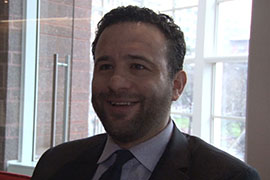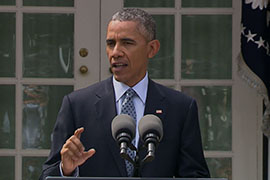Cronkite News has moved to a new home at cronkitenews.azpbs.org. Use this site to search archives from 2011 to May 2015. You can search the new site for current stories.
Iran nuclear pact sparks deeply divided reaction from Arizona lawmakers
WASHINGTON – Arizona lawmakers split over a White House deal aimed at keeping Iran from acquiring a nuclear weapon, calling it everything from a promising step toward peace to a step down a “disgraceful path” with an enemy.
President Barack Obama on Thursday said the deal between Iran, the U.S. and several other countries is a “historic understanding with Iran, which, if fully implemented, will prevent it from obtaining a nuclear weapon.”
Under the terms of the deal, which still needs congressional approval, Iran would reduce its stockpiles of uranium, cut the number of centrifuges that could produce uranium by two-thirds and agree to allow international inspections and access to its nuclear facilities, among other measures.
In exchange, the U.S. and other countries in the deal – the United Kingdom, France, Germany, Russia, China and the European Union – would lift long-standing sanctions against Iran that have been crippling the country’s economy.
Obama said the deal came “after many months of tough, principled diplomacy” that resulted in “a good deal, a deal that meets our core objectives.”
“This framework would cut off every pathway that Iran could take to develop a nuclear weapon,” he said at the White House. “Iran will face strict limitations on its program, and Iran has also agreed to the most robust and intrusive inspections and transparency regime ever negotiated for any nuclear program in history.”
Not all lawmakers were convinced.
“While I intend to review the details of this agreement closely and look forward to a full briefing from the administration, this agreement raises serious questions and concerns,” said Sen. John McCain, R-Ariz., in a prepared statement. “That is why the Congress must be actively involved in reviewing and ultimately approving a nuclear agreement with Iran.”
Rep. Matt Salmon, R-Mesa, was more blunt, calling the deal a threat to U.S. security.
“When a belligerent nation demands a nuclear weapon, the United States shouldn’t cave to those demands,” Salmon said in a statement released by his office. “When that belligerent country repeatedly chants, ‘Death to America,’ we should act with strength and determination to protect our nation’s security.”
But the same deal that was blasted by Salmon as a step down a “disgraceful path” was welcomed by Rep. Raul Grijalva, D-Tucson, as a “promising step toward lasting peace and security.”
“It is a diplomatic victory that exhibits exceptional leadership from President Obama,” Grijalva said in a statement with other Democrats. “Lawmakers from every political persuasion should applaud and support his ongoing efforts.”
Obama said that if there is evidence that Iran “backslides … there will be no deal.”
Details of the deal still have to be hammered out before it can be presented to Congress. Those negotiations are scheduled to be done by June 30.
Benjamin Friedman, a research fellow in defense and homeland security at the Cato Institute, said the framework announced this week is vague on the timing of lifting of sanctions. But he still thinks the deal is “terrific.”
“The problems between the United States and Iran are one of the big sources of risk and potential for war we have left,” Friedman said. “I think this is a way of avoiding that.”
McCain quoted former Secretary of State Henry Kissinger, who said the “administration’s approach to nuclear diplomacy with Iran has moved from preventing proliferation to managing it.”
But Friedman said Friday he is not sure that a stricter deal was even possible. He said hardliners in Iran who are complaining that their country gave away too much “actually have a more valid complaint than our hardliners or the Israelis saying we gave away the store.”
“I think that it’s actually a pretty good deal for the United States,” Friedman said. “So in diplomacy there are always two sides. So just to say that we should have negotiated harder- well you have got to have the other person agree.”









